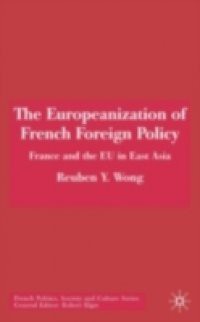This book applies "Europeanization" theory to French policy in East Asia, testing the extent to which three dimensions of the europeanization process are evident and mutually compatible. Whether and how EU membership and the Common Foreign and Security Policy (CFSP) make a difference to French policy and vice versa, is evaluated over the period covering the second term of President Francois Mitterrand (1988-95) and the first term of President Jacques Chirac (1995-2002). French preferences, statements and actions are compared with those of Community institutions (the Commission, the European Parliament), the Council and other major EU Member States (especially Germany and Britain). Most studies argue that if there is any europeanization taking place, it is limited only to the bottom-up national projection variant that seeks to amplify French policies as European, i.e. to 'Gallicise' European policy. This study examines the record of French and EU interactions with China, Japan and Vietnam in the areas of economic exchanges, political-security relations and human rights. It argues that the utility and impact of EU institutions and the CFSP on French foreign policy behaviour is more significant than is commonly imagined or admitted, and that the foreign policies of EU member states tend over the long term towards covnergence.

